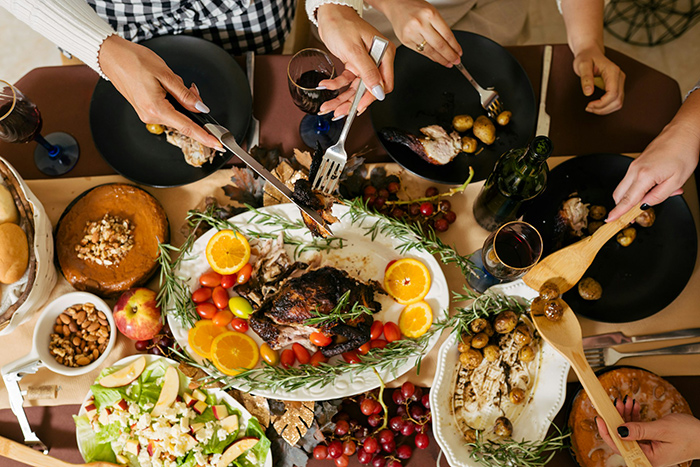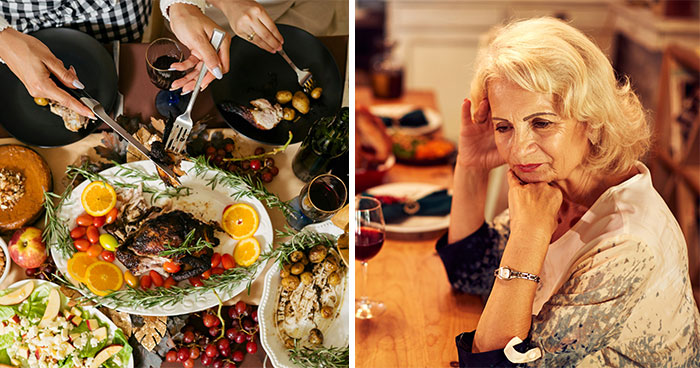One of the wildest parts of marriage is stepping into a whole new family: learning their quirks, swapping stories, and trying to fit right in. You share your favorite things, try to understand theirs, and hope it all blends together like a good recipe. But sometimes, instead of warm hugs, you get cold criticism.
That’s exactly what happened to one woman who poured her heart into hosting Thanksgiving for her in-laws. She spent two full days cooking a feast with her own modern twist… only for them to tear it apart and call her a “bad wife.” Keep reading to see how a holiday meant for gratitude turned into a recipe for family drama.
Many families love sticking to traditional meals during the holidays, it’s comforting, and familiar

Image credits: Andy Quezada / unsplash (not the actual photo)
One woman revealed how her nontraditional take on Thanksgiving dinner was harshly criticized by her in-laws






Image credits: croquem__bouche / envato (not the actual photo)


Image credits: croquem__bouche
She explained that she isn’t a particularly religious person and shared even more details about how the entire dinner unfolded
















The Indian dessert market is enormous, with people deeply attached to their traditional favorites
When someone says Turkey, most people picture Thanksgiving feasts and tables overflowing with comfort food, the same way hearing Christmas instantly brings to mind gingerbread, plum cakes, and hot chocolate. Food has this magical ability to anchor us to traditions almost instantly. Across cultures, festive dishes become part of the celebration itself, so much so that the holiday feels incomplete without them. Every country has dishes that show up only once a year, making them even more special. It’s amazing how the world celebrates its festivals with a plate in hand.
Desserts follow the same universal rule: no celebration feels whole without something sweet. In many regions, every festival is practically defined by its signature dessert. India is a perfect example, where each celebration has its own sweet tradition. During Holi, families prepare colorful treats that match the vibrancy of the festival. Diwali turns the entire country into a glowing marketplace of mithai boxes.
According to Statista, the Confectionery & Snacks industry is enormous and still growing. Revenue in 2025 alone is projected to reach US$23.67 billion. The market is expected to grow annually by 6.31% between 2025 and 2030. By 2030, the total volume is predicted to reach 5.85 billion kilograms. Even 2026 is projected to show a volume growth of 3.8%. All these numbers show just how big and competitive this market really is. People love their snacks and sweets, and demand isn’t slowing down. The industry is evolving quickly, fueled by both tradition and innovation. With stats like these, it’s clear this is a massive space to enter.
In such a huge and traditional market, introducing nontraditional desserts like cakes and brownies isn’t a simple task. People already have strong attachments to the sweets they grew up with. Winning their trust requires patience, creativity, and a lot of tasting. Today, we spoke with Akshita Agarwal from caramella_by_akshita, a brand that has carved a space for itself in Kolkata. She specializes in premium artisanal tiramisus and modern desserts. Her journey shows how passion can blend beautifully with innovation. Competing in a mithai-driven landscape is bold, but she has managed to make her mark.
“People absolutely love gulab jamun and ladoos, those are always the first choices for gifting,” Akshita shared. “These classics have been around for so many years that they feel familiar and safe.” She explained how deeply emotional and nostalgic people are about these sweets. They remind them of festivals spent with family, childhood celebrations, and happy moments. For many, these flavors are part of their identity. Getting customers to explore something new was definitely a challenge. Traditional mithai has a charm that’s hard to shake. But rather than fighting this, she chose to understand it. Respecting those preferences became step one.
It’s always exciting when the older generation is willing to try something new
“In the beginning, convincing people to try different desserts was tricky,” she laughed. “So we started really small, offering free samples just to break the ice.” Gen Z instantly connected with the brand, but older generations needed more time. They already knew their favorite sweets and rarely stepped outside them. To bridge that gap, she started experimenting with fusion-style creations. Ras Malai Cake, Gulab Jamun Cake Jars and similar flavors soon appeared on the menu. These blends quickly caught people’s attention and became instant favorites. Customers found comfort in the familiar flavors and excitement in the new form. It was the perfect meeting point between tradition and novelty.
“We realized that dessert isn’t just about taste, it’s tied to emotions,” Akshita said. “People want to hold on to their traditions because they carry memories.” Instead of trying to replace classic mithai, her team decided to blend traditional flavors with modern textures. This approach gave customers something new without losing what they love. It honored their nostalgia while still feeling fresh. By respecting emotional connections, they created desserts that appeal across generations. Slowly, this fusion style started winning hearts everywhere. It proved that tradition and creativity can coexist beautifully.
“I believe it’s always best to conclude on a simple thought,” Akshita said with a smile. “Tradition doesn’t have to be replaced to make space for something new.” She emphasized that food evolves the same way people do: slowly, naturally, and with an open mind. Her brand’s journey taught her that blending old and new can create something truly memorable. It’s not about proving one dessert better than another; it’s about expanding the table. She feels that every sweet, whether classic or modern, has its own charm. What matters most is the joy it brings to the person eating it. And if a dessert can spark conversation or curiosity, that’s already a win. For her, that’s the perfect note to wrap things up on.
In this particular scenario, it did feel like the woman’s nontraditional dishes were judged a bit too quickly. It’s understandable that people cling to familiar flavors, but such harsh criticism seems unfair. A little openness never hurts, especially when someone puts effort into cooking. Food has a funny way of changing minds when given a chance. Everyone has different tastes, but kindness should stay constant. And honestly, trying a new dish costs nothing, who knows, it might even become the next family favorite.
Readers were quick to call out her in-laws’ behavior, saying it was rude and uncalled for













![Klay Thompson Ignores Steph Curry After Mental Lapse in Warriors Loss [WATCH]](https://citigist.com/wp-content/uploads/2024/02/Klay-Thompson-Ignores-Steph-Curry-After-Mental-Lapse-in-Warriors-380x200.jpg)



